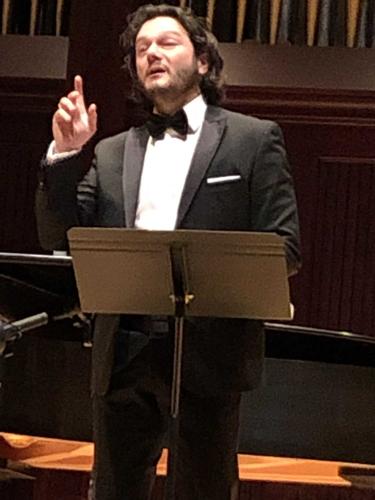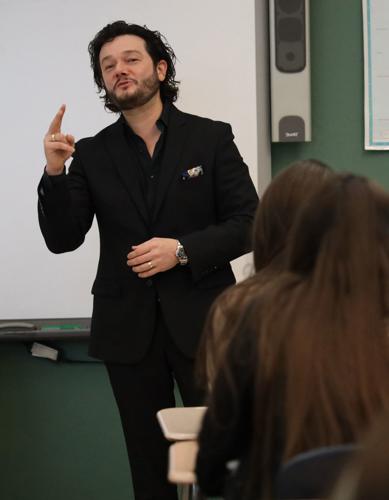You could see it in Mexican tenor Arturo Chacón-Cruz’s boyish smile.
He was going to pull a Pavarotti on that grand finale of Eduardo di Capua’s beloved and oh so familiar “ ‘O sole mio.”
The audience packed into Holsclaw Hall Friday night held its collective breath.
We sat up straight in our seats and waited for it. And when it came — that soaring, oh-so-smooth lyrical tenor with shades of warmth and an underlying strength and confidence — it was almost like a revelation: Why have we not heard this man before now, especially since he’s from our own backyard?
Chacón-Cruz’s recital was one of the most anticipated events of the 2019 Tucson Desert Song Festival, and for good reason: the Nogales, Sonora, native is largely regarded as one of Mexico’s brightest opera stars and to see him in the intimate confines of Holsclaw was like being invited to his home and having him sing some of our favorite beloved art songs and opera arias while we sat on his couch.
It’s easy to imagine Chacón-Cruz, the festival’s artist-in-residence, having that impact regardless of the space. Perhaps it was his smile or the way he wrung his hands when he was singing a dramatic passage or took one commanding step forward to emphasize the urgency of the text and the moment. He just made us feel like if he wasn’t this rising international opera star and we weren’t just some ordinary folks in the audience, we could totally be friends.
With the pretty terrific Spanish pianist Roberto Berrocal accompanying him, Chacón-Cruz performed a program that borrowed from Mexican art songs, including the ubiquitous “Bésame Mucho” and “Despedida,” and Spanish opera (zarzuela), including “Bella enamorada” from “El Último Romántico.”
He serenaded us in the opening segment of Neopolitan songs that touched on all aspects of love, from the delightful “Funiculi, Funiculá” to the bitter lament of “Core ‘ngrato,” then transported us to the opera stage with arias from Massenet’s “Werther” and Ponchielli’s “Cielo e Mar” that showcased his tenor range in all its glorious timbres. We also got a preview of what lies ahead for him when he makes his role debut this summer as Rodolfo in Verdi’s “Luisa Miller.” His clarion high notes at the end of the “Quando le sere al placido” aria were goose-bump inducing.
Chacón-Cruz kicked off a tango segment with Mariano Mores’s “Uno,” which is a favorite of his mentor Placido Domingo, with whom he often shares a stage. Then he devoted the rest to the seminal Argentine tango composer Carlos Gardel, including “Volver” and “Por una Cabeza.”
After each song, the audience erupted in applause and shouts of “Bravo!” He barely had the climatic finale of Agustín Lara’s “Granada” out when the crowd leapt to its feet in a standing ovation. After several bows and a quick slip backstage, Chacón-Cruz returned to perform an encore that he had teased on Twitter earlier in the week. (“Preparing surprises for the recital in Tucson! #Hallelujah with my talented friend #RobertoBerrocal @piaanno @ Holsclaw Hall.”)
For the longest time, he told the audience, he could not sing Leonard Cohen’s “Hallelujah” without crying. He got a bit choked up, but his performance, which dipped to the lower registers of his tenor and recalled his younger days as a baritone, was moving enough to bring us to tears.
Friday’s audience included his parents, siblings and old friends from Mexico sitting in the front rows and officials from the Mexican Consulate in Tucson seated on stage. The consulate co-sponsored the concert with Arizona Opera and the Arizona Opera League of Tucson.







